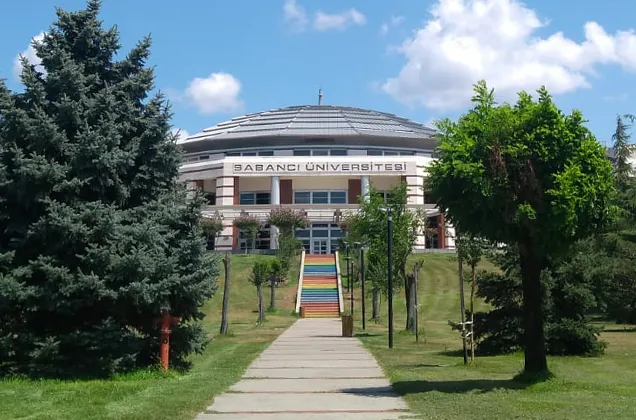25/06/2015
MİLRES is the largest civilian R&D project in the history of Turkey
The MİLRES (National Wind Energy Systems) project was introduced in a public event. Sabancı University is the Project Director and in charge of Mechanical Systems.
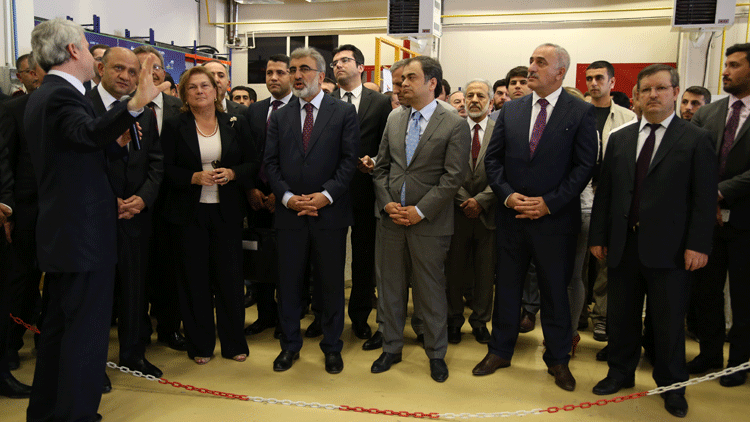
Attending the meeting at İstanbul Ulaşım AŞ were Minister of Science, Industry and Technology Fikri Işık, Minister of Energy and Natural Resources Taner Yıldız, Sabancı University Founding Board of Trustees Chair Güler Sabancı, President Nihat Berker, Faculty of Engineering and Natural Sciences Dean Yusuf Menceloğlu, SUNUM Director Volkan Özgüz, as well as representatives from other project partners TUSAŞ/TAİ, İstanbul Ulaşım AŞ, TÜBİTAK MAM and ITU. Faculty of Engineering and Natural Sciences member and MİLRES Project Director Mahmut Akşit made a presentation about MİLRES.
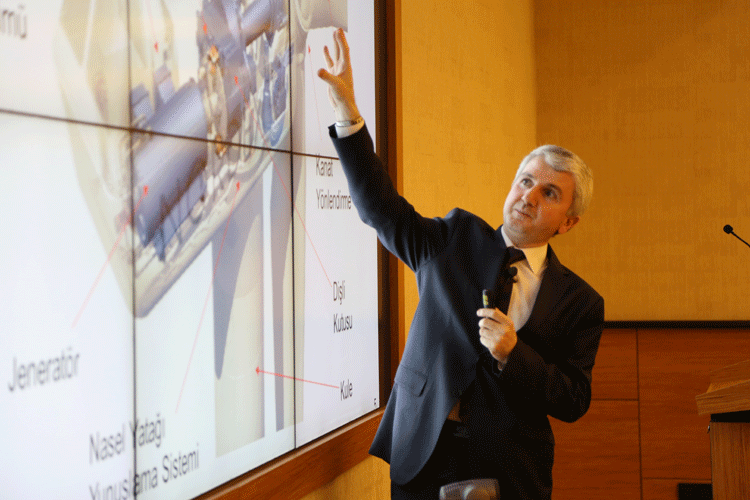
Minister of Science, Industry and Technology Fikri Işık: "Wind energy is booming in Turkey, but unfortunately the technology is entirely dependent on imports. One of Turkey's most important goals is to become a producer of technology. Investments that will reduce Turkey's import dependency in energy are priority strategic investments." Explaining that the need for energy in
Turkey grew rapidly, resulting in large investments in renewable energies, Işık said "This is why this project is important to us. What matters here is that the prototype is more than 90% domestically produced."
Minister Işık pointed out that a domestic technology would help Turkey save USD 15 billion in imports, and continued "The project will create direct employment opportunities for 100,000 people and indirect opportunities for a quarter of a million."
Minister of Energy and Natural Resources Taner Yıldız said that all protocols signed for domestication and domestic production to date have had significant benefits, this being extremely important for the industry in Turkey.
Yıldız said that Turkey grew faster than the world, and the growth rate of the energy sector exceeded that of the economy: "Because they have to grow. Under these circumstances, we must manage both growth and change properly. These must be obtained from domestic sources, and renewable energy sources among them."

Minister Yıldız said that there were 4000 MW of wind power in operation and another 2000 MW under construction, and continued: "While we reduce operating expenses, we must avoid acts that will be detrimental to the current account deficit. As a result of our investors' confidence in political stability and the policies and strategies in the energy industry, we recently went on offer for 3000 MW of wind power, and received almost 44.000 MW of bids in return. This is tremendous support both for the political stability in Turkey and the structure of the energy industry. This will not end here; we will continue to improve and grow."
Yıldız emphasized the need for both the private sector and academics to play their part in supplying the market with domestic resources, saying "A tractor consists of approximately five thousand parts, an automobile of 10,200 parts, and a nuclear power plant of 515,000 parts. We will be able to make all of them. This may take 10 or 20 years, but in the end, when the youth of today grow to be my age, we will be making all of these ourselves."
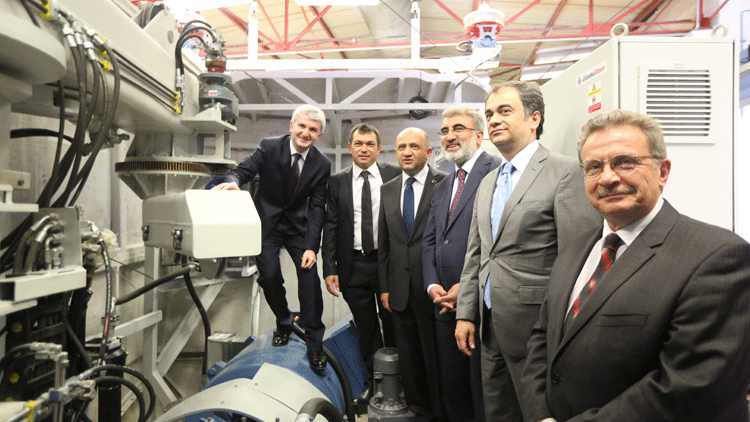
Bakan Yıldız, şu anda işletme halinde yaklaşık 4 bin megavatlık, inşa halinde ise 2 bin megavatlık rüzgar santrali bulunduğu bilgisini vererek, şunları kaydetti:
"Bizim, işletme giderlerini düşürürken, yatırım maliyetlerini cari açığı olumsuz etkileyecek şekilde bir eylemde bulunmamamız lazım. Geçenlerde yatırımcımızın siyasi istikrara duyduğu güvenin, enerji sektör politika ve stratejilerine duyduğu güvenin bir eseri olarak rüzgarla alakalı 3 bin megavatlık arza çıktık, 43-44 bin megavatlık talep geldi. Bu hem ülkemizin siyasi istikrarına hem de enerji sektörüyle alakalı yapılanmaya çok önemli bir destek anlamına geliyor. İş bununla bitmeyecek bu gelişecek, büyüyecek."
Hem özel sektörün hem de akademisyenlerin bu pazarın yerli kaynaklarla doldurulmasına mutlaka katkıda bulunmaları gerektiğini vurgulayan Yıldız, "Bir traktör yaklaşık 5 bin parçadan, binek araba 10 bin 200 civarında parçadan, nükleer güç santrali ise 515 bin parçadan oluşuyor. Bunların hepsini biz yapacağız. İsterse 10 yıl, isterse 20 yıl sürsün ama sonuçta bir genç kardeşim bizim yaşlarımıza geldiğinde artık bütün bunların hepsi yerli kaynaklardan yapılmış olacak" diye konuştu.
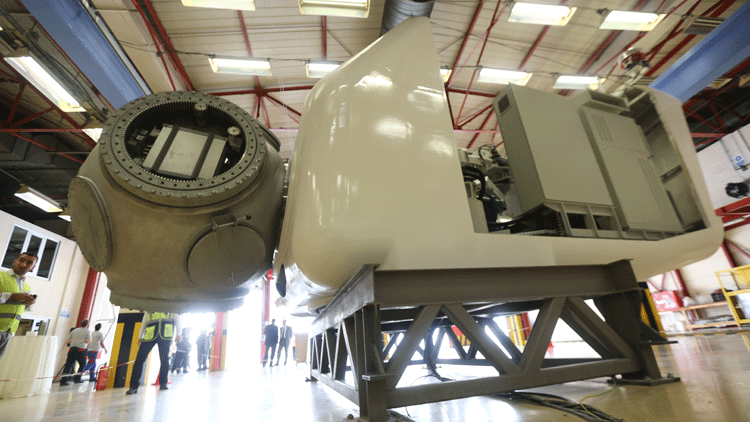
About the MİLRES project
MİLRES Project Director and Sabancı University Faculty Member Professor Mahmut Akşit made a presentation about the MİLRES project. According to information given by Akşit, the MİLRES Project began in July 2011 with the Ministry of Energy and Natural Resources as the client institution and completely domestic resources provided as part of the TÜBİTAK Public Research and Development Projects Support Program (1007 Program). As of the start date, the project is the civilian R&D prjoject with the largest budget ever in the history of the Republic. The forecasted budget for the project is TL 55 million. TÜBİTAK approved TL 10 million for the initial stage over a two-year period. The stage was then extended and the budget was revised to TL 11.5 million. Out of this budget, TL 3,832,469 is allocated to use by Sabancı University.
Project partners and their duties are: Sabancı University on the "Project Management, Mechanical Systems" work package; TUSAŞ/TAİ on the "Turbine Rotor" work package, İstanbul Ulaşım AŞ on the "Control and Electronic Systems" work package; TÜBİTAK MAM on the "Generator and Electrical Systems" work package; and Istanbul Technical University on the "Wind Analysis and Structural Systems" work package.
In the first stage of the project, 98 researchers from 9 universities and institutions, including 20 researchers from Sabancı University, and 23 graduate students including 13 Sabancı University students are commissioned. Following the completion of the production, assembly and field testing of all components in the MİLRES project, a prototype turbine rated at 500 KW will be built and commissioned in June. In the second stage of the project, a second turbine, rated at 2.5 MW, will be built. These turbines will be built on the İSKİ (Istanbul Water Company) property near Lake Terkos, and will supply the pumping station there.
The project's goal is to develop and complete prototype production of 2.5 MW wind turbines with 100% original and domestic technology to be applied on an industrial scale.
Project objectives include building the infrastructure required for an original and globally competitive wind industry based on 100% Turkish design and technology; reaching an established capacity of 40GW in the long term while meeting 25% of the demand with domestic turbine technologies to save approximately USD 10 billion in imports; developing test and production infrastructure for wind turbine subsystems in Turkey; creating employment opportunities for Turkish industrialists and laborers; training a workforce to boost local production and create export potential to similar markets; and developing wind turbine towers, rotors, generators and related power electronics systems.


